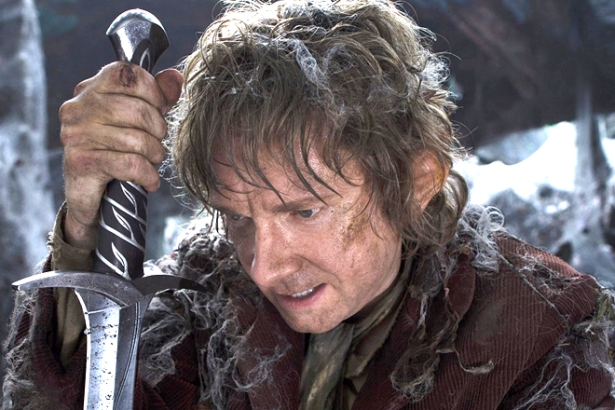I have a piece up this week on the Atlantic about violence in the new Hobbit movie.
The post has generated a long comment thread. I posted several comments myself here and there…and I figured I’d highlight a couple of my longer ones here since I don’t know that anyone will read them otherwise. They’ll be a bit disjointed…but what the hey, it’s a blog.
___________
I think there’s a lot of truth to this. But Tolkien could also see racial antagonism (as between Elves and Dwarves, for example) as evil and hurtful. And the Hobbits (especially Sam) are kind of supposed to be working class too, in some ways.
As with the violence, I tend to see race as an issue that Tolkien struggles with, sometimes successfully, sometimes less so.
___________
I don’t think sentience in and of itself predicates against the logic of genocide. In fact, I know it doesn’t. On the contrary, genocide really only makes sense in terms of sentience — you don’t use genocide to refer to the mass killing of the dodo, for example. The fact that the Goblin wants to find out what they’re doing first before killing them also seems beside the point. The issue isn’t whether they always fight each other in every circumstance; the issue is whether Tolkien presents goblins, orcs, etc., as people who can be good or evil or in between, and who it is a sin to kill if you don’t have to, or whether he presents them as vermin who should, ideally, be exterminated. I think he tends very much to present them as the second.
____________
No…it’s quite different. Twain was a committed anti-racist; Huck Finn is explicitly committed to racial equality in a way that was very courageous for its time…and for our time, for that matter.
Tolkien’s stance towards race is a lot more ambiguous. And…for those who say it was just of its time, it’s worth noting that Huck Finn was written a fair bit before LOTR. There were people at that time (Langston Hughes, for instance) who were anti-racist. Tolkien’s stance certainly could have been a lot worse — but comparing him to Mark Twain definitely shows up his limitations in this area.
______________
I think you can see the enjoyment of violence in, for example, Beorn’s attitude towards killing goblins, and the book’s satisfaction in the dead goblin and warg he displays in front of his door. Or in Legolas and Gimli’s contest to see who can kill more orcs. Or even perhaps in the Ent’s spectacular destruction of Isengard.
__________________
Saying evil is real, and embodying that evil in a particular race or group of people — that’s the logic of genocidal violence. The claim that you need to kill every one of the enemies because they are genocidal — that’s how genocide is justified too. To say that it’s a fantasy sort of misses the point as well — genocidal fantasies are also fantasies. That other tribe, over there, isn’t *really* unhuman — it’s a story you tell. But stories can have real results. Fantasies can kill.
Like I said, this is a tension in Tokien’s work, not an absolute. He very eloquently argues for peace and mercy in many way. But he also finds genocide appealing. That’s the case for most of us (it is for me — I like lots of bloody body count films.) I think Tokien actually makes us think about that, sometimes quite deliberately. How do you fight Sauron without being Sauron? How do you pick up that ring without becoming the ring’s servant? Those are pretty important questions, not less so because Tokien sometimes (not always, but sometimes) seems swayed by Sauron’s logic of murder and force.
____________

